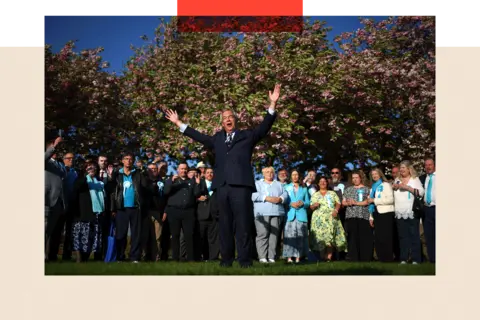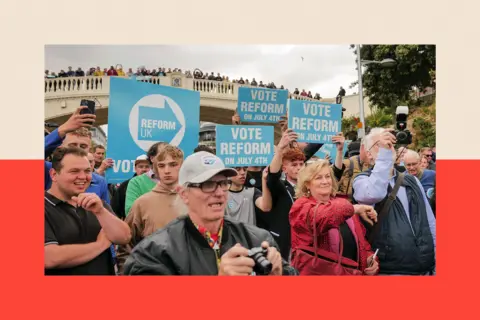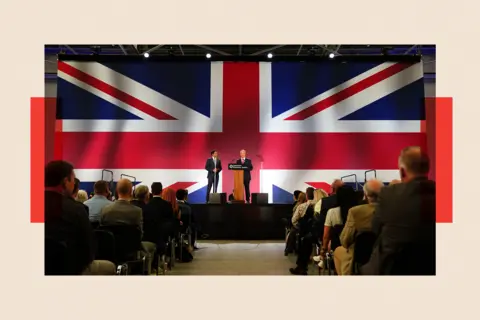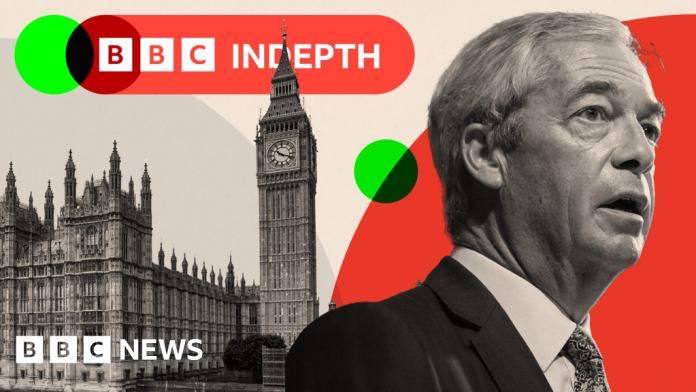 Sir John CurticeProfessor of politics at the University of Strathclyde
Sir John CurticeProfessor of politics at the University of Strathclyde BBC
BBCOn 3 October 2021, Reform UK held its first conference – a modest one-day get-together in Manchester – only a short distance from the much larger Conservative Party gathering, taking place nearby at the city’s Convention Complex at the same time.
At the Reform event, only a few hundred activists were present in the function room – and Nigel Farage, not yet party leader, was reportedly not among them. Reform was polling around 3% and had won just two councillors in that May’s local elections.
What a difference four years makes.
Reform’s annual conference takes place this weekend in Birmingham, with 5,500 tickets reportedly already sold. It is thought that one in five of the nation’s lobbyists will be there too. The party has now been ahead in the polls for five months.
Never before has a party other than Conservative or Labour been ahead in the polls for so long. Indeed, since the party’s success in English local elections in May, it has consistently been averaging 30% to 31%, enough to put it well ahead of all its rivals.
 EPA-EFE/REX/Shutterstock
EPA-EFE/REX/ShutterstockRecent attempts by YouGov and More in Common to estimate what the party’s support might mean in terms of MPs suggest that if an election were held now, Reform would be the largest party by far, albeit probably short of an overall majority. At the moment, Nigel Farage – now firmly in place as Reform’s leader - appears potentially on course to become the UK’s next prime minister.
The question hanging over the party is – can they sustain this?
The next general election could be almost four years away. Much could happen between now and then. A year into the last parliament the Conservatives were narrowly ahead in the polls – only to crash to a heavy defeat in last summer’s election.
But what could make a difference – one way or the other – to Reform’s prospects? Analysis of who is – and who is not – backing the party, and why, provides us with vital clues.
So too does an understanding of the broader UK political landscape, one in which a fragmentation of the vote away from the main parties is offering Reform an unprecedented opportunity.
A plague on both their houses?
Support for Reform might be thought to be simply a protest vote by an electorate fed up with slow growth, an ailing health service, and high levels of immigration. If so, the party’s popularity would seem likely to wane should the country’s prospects look brighter in four years.
Dissatisfaction with the state of the country certainly underpins support for Reform. For example, according to Ipsos, 68% of voters feel that the economy will get worse over the next year, up from 43% at the time of last year’s election and as high as it has ever been a year into a new Parliament. Among those whose current party preference is Reform, a remarkable 89% are pessimistic about the prospects for the economy.
 Bloomberg via Getty Images
Bloomberg via Getty ImagesMeanwhile the most recent British Social Attitudes survey, conducted last autumn, showed that a record 59% are dissatisfied with the NHS. Among those who voted Reform last year, the figure is even higher – 69%.
Most voters think that immigration is too high. An Opinium poll in August found that 71% feel that way. But nearly everyone who is now backing Reform (97%) expresses that view.
Reform supporters have little confidence in the ability of either Labour’s leader, Prime Minister Sir Keir Starmer, or the Conservative leader, Kemi Badenoch, to address these issues. Most lack confidence in Sir Keir’s ability to handle the economy, the NHS, and immigration. However, at the same time, on balance their judgement of Badenoch’s abilities is a negative one too.
Indeed, Reform supporters have even less confidence than Conservative supporters in Sir Keir’s abilities. At the same time, they have less confidence than Labour supporters in Badenoch’s capabilities.
For example, 58% of Conservatives lack confidence in Sir Keir’s ability to turn the economy around – well short of the 76% of Reform supporters who express that view. Meanwhile, 40% of Labour supporters doubt that Badenoch can tackle the economy, less than the 47% figure among Reform supporters.
A powerful magnet
Reform supporters seem to have lost faith in the ability of either of Britain’s two traditional governing parties to address the country’s most pressing problems.
In contrast, they do have confidence in Farage. This is especially so for immigration, but he also scores well on the economy and the NHS.
Among those currently backing Reform, 84% approve of the job Farage is doing – far higher than the equivalent figure for Sir Keir among Labour supporters (62%) or Badenoch (46%) among Conservatives.
While Farage is not so widely admired in the wider population, his ratings among voters in general still compare favourably with those of his rivals.
In Opinium’s most recent poll, for example, rather more say they disapprove (40%) than approve (30%) of how Farage is handling his job as Reform leader. But that still means that more approve of the job he is doing than approve of Sir Keir (21%) or Badenoch (16%).
The Reform leader is proving a powerful magnet that is attracting discontented voters into his party’s camp.
The party’s future prospects seemingly rest heavily on Farage remaining its leader. The party might struggle to keep its support if Farage departed the political scene. At the same time, voters might drift away if the country’s prospects improve under Labour or if Badenoch can persuade them that she and her party have better solutions than Farage.
The Brexit factor
Politicians do not talk much about Brexit these days. Yet, Brexit is a major fault line that sharply distinguishes those who do and do not support Reform. The party’s support stands at no less than 53% among those who voted Leave in 2016. In contrast, just 11% of those who backed Remain are to be found in the ranks of current Reform supporters.
But to misquote a former prime minister, Brexit means more than Brexit. Those who voted Leave in 2016 have distinctive views on a range of so-called cultural issues.
They are especially concerned about immigration, they are doubtful about many equalities policies, and they are more inclined to be sceptical about climate change.
 Getty Images
Getty ImagesThese views are widely prevalent among those currently inclined to vote for Reform but are often out of kilter with the population as a whole.
According to the latest British Social Attitudes survey, 81% of those who voted Reform last year believe that migrants have undermined rather than enriched the country’s culture. Equally 73% feel that migrants have been bad for the country’s economy. These figures are very different from those among voters in general, just 31% of whom believe that migration has undermined Britain’s culture, and only 32% feel it has been bad for the economy.
Meanwhile, 53% of Reform voters believe that attempts to give equal opportunities for lesbians, gay men and bisexuals have “gone too far”. Some 49% say the same of equal opportunities for black and Asian people, while 71% express that view in the case of transgender people. The equivalent figures among the general public are 33%, 18% and 50% respectively.
Only 33% of Reform voters believe that climate change is being caused mainly by human activity, far fewer than the 54% figure among the public in general. As many as 25% state that the climate is largely changing as a result of natural processes, a view shared by just 8% of all voters. Reform voters are less supportive than other voters of virtually any measure designed to address climate change.
 AFP via Getty Images
AFP via Getty ImagesOpposition to immigration, equal opportunities policies, and climate change measures feature prominently in Reform’s campaigning – which often cites spending on these issues as alleged examples of government waste. Indeed, Reform voters are noticeably less keen on government spending too. Only one in four (25%) believe taxes should be increased in order to spend more on “health, education and social benefits”, much lower than the 46% of all voters who take that view.
The party is singing a tune that is widely popular among the many Brexiteers who have been recruited into the ranks of its supporters.
Doing so has enabled the party to capture much of the coalition of Leave voters that gave Boris Johnson his mandate in 2019 to deliver Brexit. The Conservatives lost one in four of their 2019 supporters to Reform at the last election – and now, on top of that, Badenoch’s party has lost another three in 10 of those who were still loyal to the Conservatives last year. In total, that means half of those who voted for Johnson in 2019 are now backing Farage.
Consequently, support for the Conservatives among 2016 Leave voters (23%) is only a little higher now than among Remain supporters (14%). In 2019, 75% of Leave voters (and just 20% of Remainers) backed Johnson.
At the heart of Reform’s success is a fundamental realignment of the party preference of Brexit supporters.
 EPA/Shutterstock
EPA/ShutterstockThis suggests that, even if Labour is able to address the country’s policy challenges successfully between now and the next election, support for Reform will not simply disappear. After all, in contrast to the Conservatives, Labour have lost only one in eight of its 2024 voters to Reform.
Rather, what will be key to Reform’s fortunes and specifically its vote share will be the outcome of a battle with the Conservatives for the support of pro-Brexit, socially-conservative and climate-sceptic Britain. Such voters are far from representative of the country. However, they are providing Farage with a niche market of support that, presently at least, is enabling him to make much of the political weather.
A fragmented landscape
There is one other potential obstacle facing Reform. The party is currently benefiting from a fragmentation of support among its rivals.
We have heard lots about Labour and the Conservatives both losing votes to Reform. But on the socially-liberal side of politics, too, support has been seeping away from the historically mainstream parties.
The most recent polls suggest 9% of Labour’s 2024 vote has gone to the Liberal Democrats and 6% to the Greens.
Reform’s current tally of 31% has never been sufficient to win an election. But in today’s fragmented political landscape in which the combined poll ratings for Conservative and Labour are at an historic low, it could be.
Should Labour or the Conservatives recover, however, the picture would be very different.
For instance, if Labour could match Reform on, say, 30%, perhaps by squeezing the Liberal Democrats, the Greens and the nationalist parties, they would probably win many more seats than Reform. Labour’s vote is more geographically concentrated which means it is better able than Reform to turn votes into constituency seats.
 PA Media
PA MediaWhether those with little appetite for Farage remain fragmented in their loyalties or become consolidated behind one party could therefore be crucial in determining Reform’s chances of power.
Meanwhile, given how much of Reform’s support comes from former Conservative voters, any recovery by the Tories would be an even bigger problem for Farage because it would most likely involve them taking votes directly from his party.
If the political scene does become less fragmented, Reform would need to think about broadening its appeal beyond its core issues of immigration, equalities and climate change. Despite widespread pessimism about the country’s financial health, at the moment voters beyond the ranks of the party’s existing supporters are less willing to trust the party on economy than they are on immigration.
Whether Farage can reach out beyond the ranks of socially-conservative Britain could yet be crucial if the party is eventually to succeed in its bid for power.
John Curtice is Professor of Politics, Strathclyde University, and Senior Fellow, National Centre for Social Research and The UK in a Changing Europe.
BBC InDepth is the home on the website and app for the best analysis, with fresh perspectives that challenge assumptions and deep reporting on the biggest issues of the day. And we showcase thought-provoking content from across BBC Sounds and iPlayer too. You can send us your feedback on the InDepth section by clicking on the button below.


